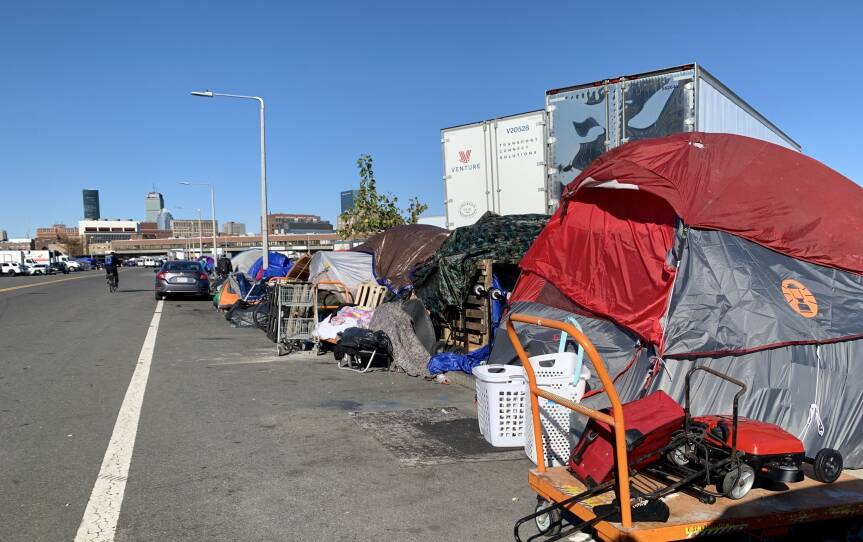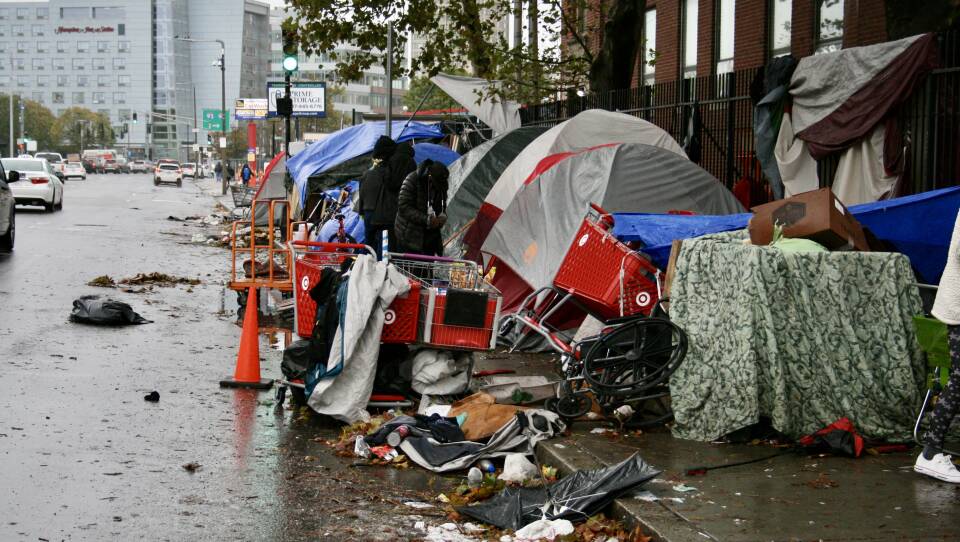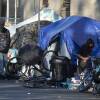A Suffolk Superior Court Judge on Wednesday denied a request from the ACLU of Massachusetts for a temporary restraining order aimed at stopping the city of Boston’s dismantling of a homeless encampment near Massachusetts Avenue and Melnea Cass Boulevard, known as Mass. and Cass, near the city’s South End.
In her ruling, Judge Janet L. Sanders cited “certain problems” with the ACLU's argument, namely that no one has been arrested during the operation and that shelter beds are available. Regarding the ACLU’s claim that there is a “constitutional right to a certain kind of housing,” Sanders said that is “further than any court has ever gone.”
Though Sanders denied the request, she emphasized that the city needs to take steps to improve conditions for people displaced at Mass. and Cass — and do so prior to an evidentiary hearing scheduled for Nov. 29, when witnesses will be expected to testify and be cross-examined.
“This case has already received some attention,” Sanders said in her ruling. “What happens in the next 12 days is likely to receive the same public scrutiny. Indeed, those elected to represent us perhaps have the greatest interest in making sure that in this interim period, those at Mass. and Cass are treated with dignity and respect and afforded as much help as government resources.”
More Local News
In October, former acting Mayor Kim Janey issued an executive order stating that “tents and temporary shelters will no longer be allowed on the public ways in the City of Boston.” Attorney Lisa Maki, who represented the city of Boston, told the court that the removal process will not be as strict as that order states.
"You can have a tent on a sidewalk in the city," Maki said. "When the notice for removal and protocol steps are followed and the tent is still there, it is subject for removal." She added that tents can only be removed after the city has provided both 48-hour notice and an offer of shelter.
ACLU attorney Ruth Bourquin said she takes this as a small victory.
“That's a very different message that was given to the court by a representative of the city today than has been given to our clients,” Bourquin told reporters after the hearing. “I want to make sure our clients know this, because right now they are on the streets of Boston, scared to even put a tent over their head in order to try to keep themselves safe.”

The ruling came just hours after Mayor Michelle Wu told reporters the city would “pause” the ongoing sweep until the court ruled in favor of the ACLU’s request for a preliminary injunction.
Wu told reporters Wednesday she will continue working with Dr. Monica Bharel, her recently appointed "Mass. and Cass czar," and other stakeholders “to ensure that we’re bringing a public health and housing-first lens.”
When asked if the executive order would resume if courts ruled in favor of the city, Wu responded, “not necessarily.”
Despite the pause, in court Maki argued in favor of continuing to clear tents. She cited public health issues, an infestation of rats, an excess of garbage and waste and blocked sidewalks.
“It is the city that faces irreparable harm if this waits any longer, it is the city’s preference that people are placed in individualized housing,” Maki said. “We’re not saying we don’t want that, it just doesn’t exist right now. Individualized housing is not a process that would be set up overnight.”
Maki also cited crime statistics that she said put the city in danger: six homicides in the area in the last year, 122 unattended deaths, and 13 reports of sexual assault.
The answer to these problems, Bourquin argued, is not “that the government can destroy your current living place and send you to someplace that may or may not be able to accommodate you, but is structurally set up in a way that you know only a few people can be accomodated,” Bourquin said. “[The city] just admitted private housing doesn’t exist yet.”
So far, the city’s efforts in accordance with the executive order have placed 39 people in shelter, 126 in medical treatment facilities and 16 in housing, including 12 people who are now in permanent housing, according to Maki.
But without transitional housing options available for everyone, many people living on Mass. and Cass have told GBH News they would rather remain on the street than live in a shelter environment. As of Tuesday, a new encampment of around 30 tents was created in Newmarket Square, just a few blocks east of the city’s targeted clearing site.
Janey’s executive order states that if a tent owner refuses to remove their belongings off the street, it “may be considered disorderly conduct and subject to enforcement of the existing laws of the Commonwealth of Massachusetts.” The city maintains that no arrests of this nature have taken place, though Bourquin argued that the order contained language constituting the threat of arrest, which she says is a violation of civil rights.
“So I guess it’s a ‘we should cross that bridge when we get to it’ type of thing,” Sanders said. “The city hasn't arrested anybody. The order doesn't require it. It's not even clear an arrest is going to happen there.”

On Monday, state officials confirmed to GBH News that a part of the 13-acre Shattuck Hospital campus in Jamaica Plain will be converted into a “temporary cottage community” in December.
Up to 30 people experiencing homelessness will be accommodated in low-threshold transitional housing “in their transition from the streets to permanent housing and longer-term stability,” Health and Human Services Secretary Maylou Sudders wrote in a letter to residents of the South End and Roxbury. “The safety of the residents as well as hospital staff, patients and the surrounding neighborhoods is paramount.”
Janey also sent out a request for information to local providers this week, requesting help to establish low-threshold housing options and other services by Nov. 22.
“They’re not there yet, and there are only 30 of them,” Bourquin told the court, in reference to the housing units at Shattuck. “The premise of our whole argument is that the city has put the cart before the horse.”









